During our Goethe reading group, my friend said she never feels alone walking the streets of Berlin.
There is always someone, always a presence that comes along.
I certainly feel it, Bruno from the movies, der himmel über Berlin.
The layers go on and on.
Monday afternoon, Caroline lead me to a Jewish cemetery nearly destroyed, now extending into the woods....Weißensee Cemetery:
Bermann.
Lehmann.
Marcuse.
Name after name, tree after tree, graves stretching into the distance.
I turn one way, Caroline another, separated in the green.
There is a lot of history to dig through.
Berlin lives, lives that impacted by the place, impacting it.
These days, many of us here think a lot about Bowie who was here from 1976-79, traipsing about with Iggy, going to the Brucke Museum, and SO36.
Or Walter Benjamin who lived here from 1930-1933.
Before entering the cemetery, a memorial reminds us of the dark years, and those who perished here from 1933-45, the Jews and Gypsies, people with disabilities, the dissidents.
Berlin has seen it all.
It embraced darkness and came out the other side.
But the stories of those who did not make it through those years, they linger.
For several days I take a deep dive into the dark years, the jitters and violence, dogs and terror, the stench and dark power of it all. Each day, I ride to and from the Berlin Story Bunker, excavating the last hundred years of Berlin, starting in a WWII bunker, where people escaped the bombs, asking the question: “How a modern, progressive and cultured state can sink into barbarism in a very short time, culminating in unimaginable brutality and genocide. How Hitler's enthusiasm came about, how Germany became radicalized, how the Nazis led the world to its downfall and what became of the "Führerbunker".” How did the “stab in the back” myth take hold, laying blame for the WWI loss on the elites, not the commanders. With the bunker suicides of the first of May 1945, uncondictional surrender. Trümmerfrauen dug out the rubble of the bombed-out buildings, cleaning up debrie, rebuilding the city, in a divided country, on the front lines of a cold war; one side thrived, another offerred care from cradle to grave, an economic block and a wall. "We can do it" – …the turning point is 1968, the transformation of society. Changing the world in boundless trust in one's own strength – for the freedom of the oppressed, for social participation, self-realization and more democracy.
Walking, I recall a demo from August1991, stating Frederick the Great was queer. On we wander through the history from the 18th century the German Empire, Bismarck, nationalism, the darkness of the early 20th century and the fall of the Berlin Wall.
There is a lot to think about, to learn from the country. It had its worst leader while we arguably had our best in the 1930’s, seemingly, switching roles in the last few years.
“You see a tipping of the scales,” said one American here, referring to the remains of our democracy back home.
“You see a lot of solidarity and support here,” said J, an American living in Berlin, referring to refugees, who Germany has tried to embrace, seemingly correcting past wrongs.
In the meantime, the clashes are only accelerating back home.
“It was a good run, but we need to separate,” they continue. “It's what needs to happen. Transitions are difficult.”
“Over 50 percent of Americans expect a civil war 'in the next few years'” reported one Poll on JULY 20, 2022; “two-thirds of respondents agreed that "[t]here is a serious threat to our democracy," while more than 40 percent indicated that "[h]aving a strong leader for America is more important than having a democracy."
Yet, there have been times when we felt a solidarity, across borders.
These days, that feeling is tenuous.
“I think it's going to change its face, but not dissolve,” said J, referring to Europe. “People have an expectation of what government provides. Other things are expected. They don’t want that to go away.
The US on the other hand, inspires less optimism.
“At this point, the genie is out of the bottle.”
Democracy seems perhaps too cumbersome,” argues J. “If there was an enlightened despot who could address climate change and gun violence, that might be ok.” The problem is one does not know what they are getting into. The thirst for power is strong, notes Caroline, reflecting on this conversation. You want Utopia but you get Nazis; you want socialism, you get National Socialism. It happens again and again and again.
“Putin is murderer,” says the mural on Prenzauer Allee.
Some American lefties seem fine with him.
But people here are not so pleased.
it’s a dividing line that many can’t cross.
I can’t be friends with someone who supports him, said Z, another interviewee. “That's where friendship ends. They want my family to die.” Z worries the world has turned their back on Ukraine. The US has helped, she acknowledges. But Germany is still in business with Russia, around oil. The whole world has appeased Russia, she says, first in Crimea eight years ago. Everybody could do more to stop Russia, she says. Germany cant give up all its weapons to Russia. Has the world turned away? There is Ukraine fatigue. It's a normal reaction. But for me it's evil. Should be stopped. I’m half Russian. It's a fascist totalitarian state. It should be stopped. It's hard for her to sleep at night. Instead she organizes with other immigrants refugees.
Saturday, we met Jörg Benario at the Synagogue down the street, to take part in the” Jewish Berlin Walking Tour.”
We met him by the Old Synagogue, by our house, the Rykestrasse Synagogue. Built in 1904, the residents of the neighborhood famously protected the space, during the Kristallnacht, Night of Broken Glass, of November 9 and 10, 1938, a pogram against the Jewish population of Berlin, keeping the building from burning. Male members of the congregation were arrested and sent to the Sachsenhausen concentration camp.
Many had left earlier.
Benjamin begins his Berlin Childhood 1900 with the lines,
Jörg had his bar mitzvah at Rykestrasse. His family moved here in 1870. And so began our afternoon, exploring Jewish Berlin, the Refugee monument, and old synagogues, a life in the DDR on the other side of the wall, where they taught the difference between ideal and actual socialism, between “Marx” and the “Murks,” as he puts it, the way it really worked. Some are more equal than others, he explains, paraphrasing from Orwell.
Before the war, there were 10,000 Jews in Berlin. Growing up in the East, there were 150, he says. And he didn’t know he was Jewish for several years. You don’t know whose parents were old Stasi members, he explained. We didn’t know Marx was Jewish, growing up. That was for us to find out on our own. The theory is Marx, the practical is mortz, he says, laughing.
But we’re getting ahead of ourselves, as we walk, looking at an old Jewish alley, near our apartment.
His grandmother was born here in 1910. And traveled to Moscow in 1922. When word came things were getting worse with the Enabling Act, she decided to stay, not coming back to Berlin until 1954, settling in the East. His mom was not born until 1941. Only some of his family perished during the war. The city was divided in 1945, into zones of occupation, the east to the soviets; the other half to the US, France, and the UK. Kreutzberg, of Friedrichshain-Kreuzberg section south of Mitte, went to the US. His mom was 20 when the wall was erected. Going to jazz clubs across the city, she could not imagine the city being divided. When she heard about the wall in 1961, she laughed, imagining you could just take a train across town.
On we chat about the ever divided city, strolling toward the New Synagogue, on Oranienburger Straße,a mid-19th century synagogue.
We had to come back as good Germans to make Germany work, Jörg tells us. He grew up in the East, fighting with the skinheads; arrived here in 1969 striving for solidarity with his friends in the East. One of his friends uncles down the street was in the SS. Fights were constant. The Soviets were the worst. Pogram is a slavic word, he says, referring to the violence afflicting the Jews through the centuries, the attacks, the devastation. Jewish identity is in a diaspora. He wasn’t as courageous as the others who jumped the wall. There was plenty to do in the East, plenty of friends from school, playing tennis. They didn’t care.
There is lots of suffering from the past here, Jörg tells us. Lots.
And gradually the city changed. More and more people came. Art and higher rents followed (still cheap compared to NYC). More people came from the suburbs wanting to change the city into what they had come from instead of learn from what it is, he laments. The familiar narratives of gentrification followed. Debates about free speech followed, limiting thinking. He was fired for telling a joke. The spirit of protest that made Berlin. Now its gone, the labor strikes for better transportation, the direct action, the autonomen, on and on, gone. The fights are elsewhere.
On we stroll, past his old gallery space, through a cemetery, toward the site of the synagogue at Kleine Auguststraße 10 destroyed in the November pogrom of 1938. And then to the Missing House; a space in between homes, honoring a home that was bombed during the war and never rebuilt. Each house names those who lived there. The synagogue down the street from us survived probably because the other property owners didn't want to see the fire hurt their property. The one here wasn't so lucky. The fire dept stood watching by as it burned, with their hoses ready to keep the fire from spreading.
Our last stop is a monument to the refugees gathered, outside the old Jewish Cemetery, the group of figures, still lost, arriving, emaciated, lost, before their deportations. The reminders are everywhere.
Bullet holes still shone in the church where MLK spoke.
The conflicts were many.
In an interview in ExBerliner, Jörg Benario reflected on his relationship to Marxism after growing up in the East. “What I take from Marx is trying to find out, to make the world a fairer place. I think that was the intention. Though I’m religion phobic, I think the concepts of atonement and forgiveness are important - that's maybe something Marx could have taken more of from the religious texts. Without forgiveness revolutions end in bloody revenge, it is only through forgiveness that we create a truly classless society… I don’t believe in Marx “believers”, because Marx tried to find a scientific , materialist approach and you can’t believe in a philosopher.”
I spend days trying to keep up with interviews, in between the walking tours. Some from the east. Some from Berlin. Many are happy to speak. Each tells a different story of friendship and conflict here throughout the years.
R tells me about her life in Schnackenburg, a town in the Lüchow-Dannenberg district, in Lower Saxony, Germany,on the left bank of the Elbe. It was like an island, she told me. Berlin was like an Island. They all had to go through the DDR, like a harber, supplies. The border remains in head and heart. Here, they are closed. She has few friends. But its ok. On the DDR side, there is still some bitterness. The privatizing didn’t go well. You have to look up, Treuhandanstalt, she tells me. It's like we were occupied.
Sunday we explore our favorite cemetery near Alexanderplatz, Verwalterhaus in die Prenzlauer Allee 1 ein.
Bike out to Kreutzber, where Vivian Goldman pontificates about our fabulous flawedness. And empathized with some Americans tired of cold civil war of the USA, ever divided against itself. And enjoy a late night drink at Cafe Kotti at
Back home, we keep feeding Spider… here, not here, not eating, prowling, re emerging, lazarus like a phantom, back greeting, bathing, visiting, howling. Decide not to go to to the vet. But to go for lunch with the crew, enjoy a stroll, on the teenagers Monday, along with the cats of Berlin.
And finally, a goodbye lunch after a few weeks exploring the skate parks and DIY spaces, the clubs where Bowie and Iggy hung out, a goodbye to the cats and family, and this majestic tragic, still divided city. International flight home on their way back to LA for sophomore year. Gulp, it was supposed to be easier second time around. I still hate goodbyes. Grown up kids are a joy..gonna miss you kid... Still on the move.
They’ve gone for now, back on the move, across the planet, left coast fall and winter, possibly a Berlin spring.
No sleep, sick, exhausted and unsteady.
Back to Walterhause, for an art party, and part three of “DIAGONALE/4 TRANSFINITY
Performances by Marthe Howitz and Lena Neuburger/Ferdinand Waas…”
A beer and prayers for the dead in our fave art space, a defunct semetary 200 meters from Alexanderplatz. An artist is singing at each grave, seeming to pray. At first we have no idea. Then it makes sense in the mournful rain.
Bear calls,
The queen of England died.
She met every us president since Truman...
Something like 15 prime ministers....wow…
The end of an era.
I certainly know a lot of fingernails were torn off in Ireland.
Arms cut off in the Congo.
But the person, lived history.
Can we distinguish between individual and larger social forces?
Who needs the monarchy, says Caroline.
We can critique the colonial legacy tomorrow says Jay.
Simon Watney puts it aptly ·
8 September 2022
“The old queen is dying and in spite of all the grovelling and gushing of banal television commentators, it strikes me as an immensely moving moment, temporarily frozen between two eras, as time moves into an altogether different, symbolic gear, and ancient protocols obtain which mark the passing of monarchs, which have happily not been exercised since the death of her father back in 1952. The butt of countless jokes and parodies, the woman’s true dignity now emerges with touching clarity, as she was seen only last week visiting a bleak hospice and cheerfully dispensing her own inimitable brand of what one might simply term “life-joy” to its fortunate recipients. This I take to be the sense of being valued by someone who matters, of being close to some immensely powerful spring of energy, which is what remains of the royal healing touch, and the most atavistic and shamanic core of monarchy. Societies live by symbols as much as anything else, and as we reach the end of this long Elizabethan age, it is difficult not to wish that it could continue indefinitely, since it ties us in to far more glorious times than ours, to the post-war optimism which gave us the NHS and our membership of the European Union, to an England where altruism was the norm, rather than the incomprehensible and indeed reprehensible nonsense that it so clearly seems to our current national leadership. Indeed, nothing could provide more contrast than the crudely individualistic selfishness which is celebrated in the toxic cult of Mrs Thatcher, and the endearingly dotty, dog-loving aura of H.M. Queen Elizabeth 11. At this moment of her passing, how could one not think of her great Tudor sister and noble predecessor, whose memory remains warm and vital with a popularity which she took the greatest care to fuel in her lifetime, just as I expect the memory of our Elizabeth will remain, as long as anything worth cherishing remains of our sadly dented national identity? Now is the appropriate time to sit upon the ground and tell sad stories of the death of kings, and queens. Our Elizabeth was the queen who moved the monarchy out from its castles. Whether it can survive the move is an open question. Soon the bells will start to ring, appropriately muffled.”
New fave jazz club two minutes from our house. Lyric Cafe.
Berliners against Borders, sorrowful gypsy jazz....
Music that u can dance to…
SO36
A toxic tribute
After staying up half the night dancing at SO36, we get up early, make it to the farmers market, and off to our favourite community garden, where we read stories about the Application Trail, and join Alessandra for dinner at Clarchen's Ballroom, before catching the Babylon Orchestra playing along to Nosferatu....in all its black and white glory, allegories of plagues, blood,anti semitism, and queerness. Silent films and orchestra at the Babylon. “Nosferatu D 1922, D: F. W. Murnau with Gustav von Wangenheim, Max Schreck, Alexander Granach, Greta Schröder, 78 min. The young Hutter is sent by his boss to a certain Count Orlock in Transylvania, who wants to buy a house in Hutter's hometown of Wisborg. Hutter's journey and his return home turn into a horror trip. Vampirism as a metaphor of the war of the dead against the living, which can only be ended by the sacrifice of a lover. A court ruling for plagiarism (of Bram Stoker's Dracula) condemned Murnau's film itself to destruction. But copies of Nosferatu survived in the basements of foreign archives, which is now considered the mother of all vampire films. Tagging a potent stew of xenophobia, homophobia,and anti semitisism, its hard to tell if the film is a critique or representation of these sentiments.
Every day I try to learn something from the city. Berliners have seen it all... the worst and the best, the darkness and light. There is a lot to learn here. At night, people hang out and laugh long into the night, dancing and drag shows late into the night at SO36.
Hellos, goodbyes, and Faust...
Thinking about my buddy, who Monica rescued, we adopted, on his journey, our friend, on the road again, "going places that I've never been, seein thing i may never see again..."
We feel the ripple effect of the Ukraine invasion in countless ways here.
Early in the month, i posted a note about the Berlin winter coming.
Obviously, we want to be off fossil fuels.
And be off nukes.
Can we live without Russian Fossil Fuels and nuke energy?
Are renewables going to do the job to keep everyone warm?
Thomas O'Donnell <twod@umich.edu>
replies:
Hi Benjamin et al,
I tend to write a lot fast when someone asks such a great question. For those interested, here's my quick (rather unedited ) response:
To answer your question briefly, the German Green Party's (and German Energiewende national energy transition policy) of "100% renewables and no nuclear or fossil fuels" is/was excessively ideologically derived.
It simply is not and won't be possible to accomplish this goal in Germany (The Eighth Independent Monitors Report of the Energiewende, an annual review mandated by the Bundestag, also concluded it will not be possible to supply German energy demand from domestic renewables; in their cover letter, etc.).
In my assessment key reasons include non-existent essential technologies such as a universal/generalizable grid-scale storage method, required to back up weather-variable generation from wind and solar. Also the land-area required is not practical/possible (Note, Minister Robert Habeck wants fully 2% of all German landmass covered with windmills and will take what measures are required to block citizen suits, local government resistance, bureaucracy, etc.) and , of course, the costs - especially to completely rebuild both the national transmission and distribution grids .
Key here is that wind and solar require a constant base load power source:
- It is simply not possible without nuclear base load power - which is cheap once amortized and zero carbon (on the level of wind, if not better with Generation 3+ reactors now ready to go on a large scale after years of painful development in several countries).
- In so far as one tries to use massive wind (and/or solar) as a base load, the professed "solution" in Germany is to install 100s of small-scale (<35 MW) natural gas turbines to run in tandem/alongside wind farms.
As I usually say: natural gas *is* the de facto "grid scale storage" solution, the only one that is universally applicable.
- In fact, globally, 94% of all grid storage is pumped-hydro. Meanwhile, from Paris to Moscow is the 'Great European Northern Plane." Hence, natural gas dependence was slated to grow in Germany (unrelated to the German gas alliance with Russia).
So, the SPD/CDU with their Ostpolitik natural gas partnership with Moscow, dating from the late-1970's did not start out having one rational being to back up renewables in de alliance with a tech-romantic Energiewende of the Green Party; but it gave it certainly gave this alliance new vigor throughout the past decade, as Berlin and Mosccow started to promote the idea that it could/would be feasale to convert all the natural gas infrastructure from Yamal in NW Siberia to Germany over to hydrogen in ten years.
Merkel's Minister Peter Altmaier (CDU) and now Minister Habeck (albeit without Moscow on board) work hard to make this conversion of natural gas dependence into hydrogen use (e.g., a non-carbon gas) realistic and to perpetuate/rationalize current over-dependence on renewables and adherence to the 2022 Atomausstieg. But the German Energiewene program has ended up mired in contradictions and costs. The vulnerabilities this added in the face of the present Russian natural gas war with Europe (to support Putin's hot war inside Ukraine) is perhaps the last straw.
German energy firms are in de facto rebellion (my characterization) and are signing multiple 15-20 year, long term contracts for LNG imports, so far having leased seven FSRU (floating offshore LNG regasification and storage units ) and at least two onshore terminals are planned.
Out "super-minister of energy and climate protection" Robert Habeck's ideologically driven attempt to limit all the new LNG contracts to ten years as a quarante/promise that it will all be OK because all the new LNG infrastructure substituting for Russian pipeline gas will magically be converted into hydrogen in ten years time ... and Germany will decarbonize all according to plan is, well, aimed at the large percentage of the base of his renewabes-populist party that is, IMHO, alarmingly tech-, science-, and economic-naive. (This is no way to win a war on carbon!)
How Germany society could have gotten so deeply into this techno/eco self-deception --- one which became deeply intertwined with German trade and geostrategy under the old "Ostpolitik" label, to rationalize dragging all Europe into a deep dependence on natural gas supplied by Putin's dictatorship .... is an interesting story, to say the least.
German elites (CDU/CSU, SPD) were consistently and sharply warned by successive USA administrations of both parties and by most Central and East European, Baltic and Nordic Member states of the energy- and national-security dangers from this two-pillar German national energy and climate strategy. Germany sacrificed its soft power throughout these regions in exchange for these twin energy and climate policies.
Alaas, here we are, in the deepest energy (and climate) crisis since WWII in Europe as winter approaches. This is Putin's lever with which he hopes to split EU solidarity with Ukraine. It won't work, IMHO.
Best, Tom, or Dr. Thomas W. O'Donnell - Energy & International Affairs
Blog: GlobalBarrel.com | Publications | Press Bio | @twodtwod
Sunday, two book groups.
My first Goethe Faust reading group in the living room, unpacking it all,
“Where love and friendship mingle…
The deepest stirrings of emotion…”
Followed later that night, by a zoom session with my comrades in Brooklyn, reading Patti Smith, and her Year of the Monkey:
“No change, but then everything eventually changes. It's the way of the world. Cycles of death and resurrection, but not always the way we imagine.”
I know Mel thought he would survive Tim.
And we thought Spider would outlive Shanny.
By the end of Faust reading group, Spider was on his way, on the road again.
And Patti was on her way:
“I left San Francisco on one new year and was leaving again on another. I could feel the gravitational pull of home, which when i’m home too long becomes the gravitational pull of somewhere else.”
That was the feeling between Brooklyn and Berlin, the pull to leave and return, ever tugging at the other.
Ever leaving and looking, returning to home, and leaving, coming to grips, living with the complicated trajectories of history, swapping nightmares, good presidents, bad, one refugee crisis after another.
“... here we are still watching the same human movie,” writes Patti. “A long chain of deprivation playing out in real time on massive perpetual screens. Heart wrenching injustices constitution the new facts of life. The year of the monkey. The death of the the last white rhinoceros. The ravaging of Puerto Rico. The massacre of school children. The disparaging words and actions against our immigrants…” (p. 167).
At night, i dream about another life, a new york from long ago, before the bombs, a different new year, a different me.
The teenager looks out our balcony and writes poems about the subway, jaffee on the joad, looking at the bombed out buildings and graffiti, making their way, traveling Leonard and their best friend Walt, who understood the road like few else:
“Afoot and light-hearted I take to the open road,
Healthy, free, the world before me,
The long brown path before me leading wherever I choose.”
In between, we bike, exploring the musee de la fraise, art openings and gallery moments,
Monday, the Ramonas were playing at Cassiope.
Kai and I dropped by for the show, making new friends, New friends, dancing away to “Now I wanna sniff some glue…” “I still wanna be sedated…”
The Romonas remind us "Judy is a Punk Rocker...". "The KKK Took My Baby Away".... "Gabba Gabba hey" "Let's Go" Berlin. It's like the 70s here,in a good way.... Or maybe the Romones wrote the script....and were still playing it out...
Let's Go Ramona's ...
Looking for strawberries and stories, art installation and possibility all week long,
Ghost of an astronaut dog and other scenes from Pictoplasma, the new show at Verwalterhaus, my favorite art space / cemetery in Berlin.
The History of art is built on conflict and the wreckage of culture.
Another week, another life, trying to unpack the layers of history, that keep coming and coming.
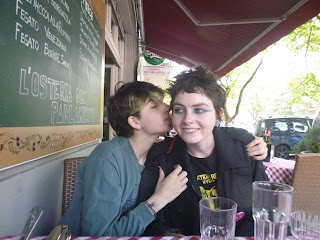
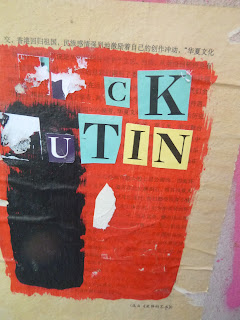










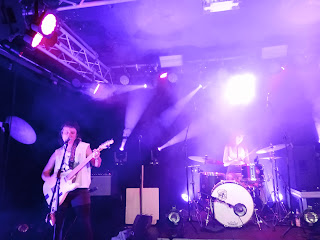




















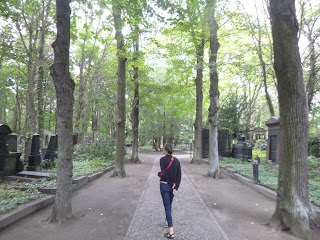






























































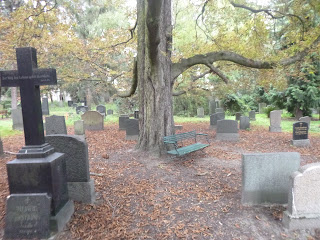
















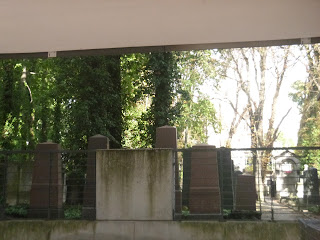
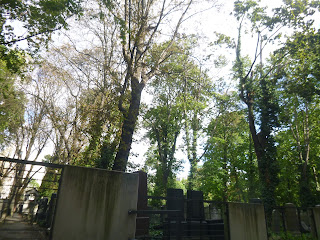


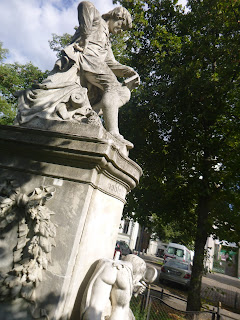




























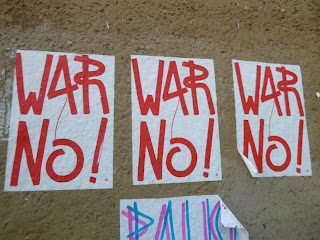




























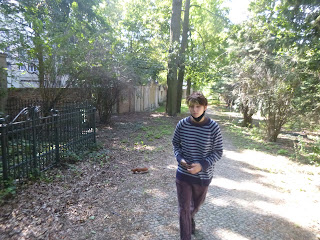



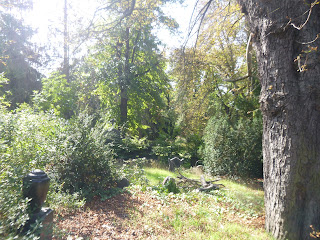






































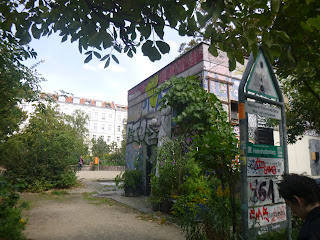











































































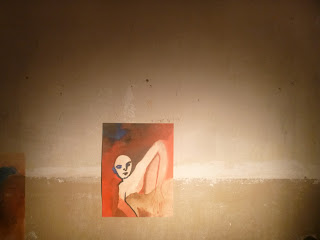



































































































No comments:
Post a Comment